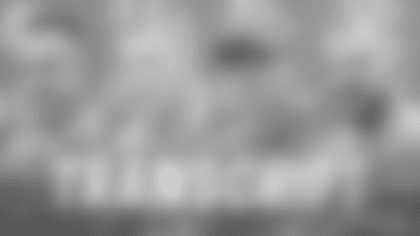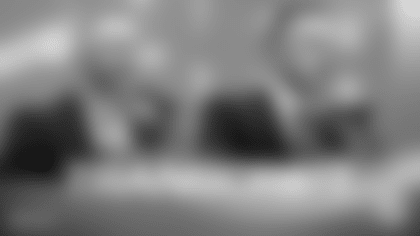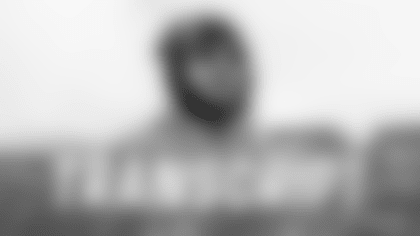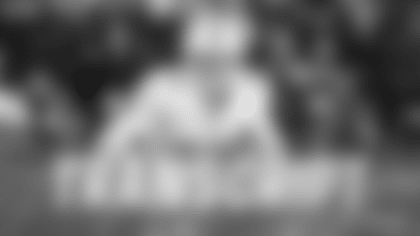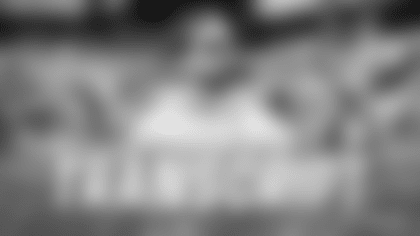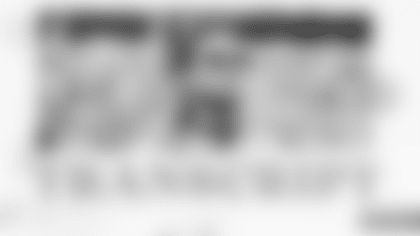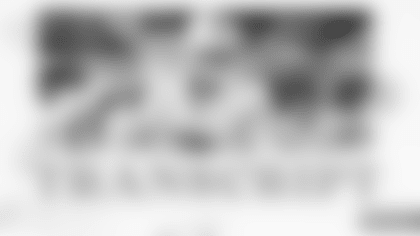Read the full transcript from Head Coach Mike McDaniel's press conference on September 15, 2025.
Q: I was going to check in on updates on OL Austin Jackson and S Ifeatu Melifonwu. With Austin Jackson, does it look long-term or do you think he might be back around the time he's eligible in four games and is Ifeatu Melifonwu a long-term thing?
"I think we'll have a shot to get him back close to return. That's kind of what we're earmarking for Austin. And then 'Iffy' (Ifeatu Melifonwu), it was good news, bad news. The good news, it wasn't anything overly severe that we were 'oh shoot, the images show this' – however it is soft tissue on a short week so I'm trying to feel out what the positive vibes from the medical outlook from this morning, what that actually means as far as this game. That will become clear as the week goes."
Q: With S Ifeatu Melifonwu I noticed on the kickoff return touchdown, he was limping. That was it?
"Yes."
Q: With RB De'Von Achane, when he steps out of bounds is that I guess for lack of a better term, his fault? Should he have had better field awareness or in the moment you just can't help that?
"It's a game of inches and what happened was Tua (Tagovailoa) quickly went through his progression, got to him and there was a flat defender. He made the guy miss. And then Alec Ingold being a captain, he transitioned from his route to be a lead blocker on the half safety, and De'Von was bringing the ball to the block as we coach it and just was a little, I think a quarter of an inch or half inch or whatever it was, you have to pay attention to the sideline. He was, but I think he thought he was a couple inches inside. So it is a game of inches. He was trying to turn the play into a touchdown and pressed it just a hair too much, but he made an outstanding play to get to that position in the first place."
Q: What's been your impression from conversations with players on where their head is at on the short week?
"I think I tried to make it very, very clear last night and my expectation talking to the guys that I've talked to today, is that our focus is super clear and it's pretty obvious. Thursday night games, after a loss they can be a blessing because you have no time to think about anything else and quite literally I can paint a picture that I think the team is understanding, is that every moment that you spend thinking about anything but the opponent is going to serve you in the worst. So I think it's extremely important that the guys are solely focused as I am on the Bills and nothing else because that's all that does matter, and truth be told, that's the formula for Week 3 every year regardless of your record."
Q: Have you felt at all or are you worried in any bit that your message and your voice isn't being received by the entire locker room at the level it needs to?
"I think I develop confidence through my watching and seeing how players respond and that's something that's always a part of my coaching process and I think if there was anything that would lend me to believe that messages weren't being received, then you address those things. To me I think I've seen a team that is trying to do everything they can to win and coming up short and pressing forward and trying to change that result. So just based upon witnessing actions, that hasn't come across my plate until you asked."
Q: This is a pretty open-ended question, but how would you define the culture inside of this building?
"How do I define the culture inside the building – I think there's a locker room full of connected people that 'they say, we do' is kind of our mantra, but we do work to produce results and we fearlessly attack things that we fail at. So as far as defining the culture, I think people are mostly responsible. Who you are working with and the direction they're going in, and I feel like we have a unified locker room and a unified really team that it's one of those things that failure provides an opportunity to see that with transparency. It's not as gray as everybody going in the same direction. A lot of times when you experience collective failure, you lose a game or two games, you get to see exactly what type of culture you have based upon how people respond. That's one of the reasons I focus on response so much because to me that's all really life is and teams are and cultures are."
Q: You guys have clearly struggled against Buffalo even before you got here. Can a team or location have an advantage on an opponent, do you think?
"If you make it. I think it's a disservice to all the people on both teams every year when people put history on top of what it – it's two teams playing each other and I think generally if you have success in one place against an opponent, over time you do have a confidence whether it's real or not real, it doesn't matter – you do. And then consequently people can have a chip on their shoulder on the losing end of it. The bottom line is, is all of it is semantics. It's two football teams playing – one on the road, one at home – but the individuals are always different and the more you can recognize that and take each game unto itself and alone, by itself, you're shortchanging the process and you'll ultimately fall victim to it. I think over time you have to take each game, each opponent, each opportunity in the National Football League, solely focus on it and everything else makes you worse in focus, preparation and execution."
Q: I don't have anything in mind when I ask you this. Given some of the issues with penalties and things like that, is there anything in the game day play-to-play operations that you feel there's a need to change for this game?
"I think another thing that you take – sometimes winning masks stuff. When you lose, it's almost impossible not to really, really iron out every detail of anything that can contribute to that. My job is nothing other than finding solutions to things. When something comes up I think that we can correct, I'm accountable for everything ultimately. That's the exact role of the head coach, so when something fails, the solution is my job; and right, wrong or indifferent – it doesn't matter who we deem accountable – it's on me and we try to correct things. I think specifically with regard to our mechanism of our particular substitution and the thing that came up at the end of the game, we met on as a staff and came up with a solution like we do everything and I think it's frustrating – I'm always frustrated when we practice stuff and it doesn't work out in the way that we've practiced it. So we've practiced all those things and when something still fails, it's my job to step in, create a solution and get everyone on the same page so that's what we do with literally everything and certainly we're not keeping the exception on the one that in my opinion kept us from having an opportunity to win the game on a potential extra point, if we could."
Q: What conversations have you had with Chairman of the Board/Managing General Partner Stephen Ross and how would you describe the tone of those conversations since yesterday's game?
"Since yesterday's game we talked about the game after the game and then talked about the preparation week for Buffalo. So kind of in-step with what I talked to the team about as well. Like everyone else, we thought we could've won the game and then we didn't and then talked about the short week in Buffalo."
Q: How do you pick up the young guys in this moment? Obviously 0-2, nobody wants to start this way. How do you prevent them from losing confidence?
"I think it's something that you start when you first get them on campus and something that I talk without relent about situations just like this. Different than a game, the objective of football is not to forecast a linear trajectory preseason and then follow that; you have to work hard and if you don't execute things across the board at a high detail, you can still work hard and lose. And then what are you going to do about that – you can't be shortsighted to overcook either way what two games mean as it relates to the next opponent. You are not avoiding any setback, you are not avoiding any un-forecasted failure or loss. That's not the NFL. The NFL is doing your best and finding humility and understanding when you do have success, that success doesn't carry over to the next opportunity. It's all very similar in that you have to – it sucks to prepare in an offseason and then you lose your first game. It always sucks, and then it sucks to prepare another week and lose again. The NFL is about doing something about it, so I think it's something that's core to how I try to talk to players, specifically young ones, that it think we're going to need to count on. That's been the only conversation that I've thus far, is how to operate when you in the immediate deem the present as negative; you operate in the present to move forward and how do you get better from everything and find a 'W' especially against a division opponent."
Q: RB Ollie Gordon II seemed to have a couple of nice snaps as a lead blocker, as the ball carrier. What does he need to do to get more action? I think he only had seven plays from scrimmage.
"I think there are a lot of things that are involved in that. We had planned on playing him a little bit more and you adjust to the game. I think whatever the snaps were in the first half, then you kind of get in the rhythm of the second half and it's kind of a different ball game at that point. His key is – I've been talking about the off-ball stuff a ton – it was awesome to see him make a play on Malik's (Washington) carry that was instinctive and really added to the overall gain on the play just by his effort and his understanding of what we're trying to get done. That being continued, I think if the plan was the same as it was last week, there's a chance he would play about double that. This week, we'll see what that looks like, but it's all about him understanding all of his roles and responsibilities. You need all 11, but we'll continue to build upon those positive snaps because he's also developing a confidence out there that when you see that and you see his assignment execution, then you build on that."
Q: We know that you put your heart and soul into everything, every week and then to see that there are so many people calling for your job and things like that. What are you doing to stay sane through all of this because most people would probably be losing their mind right now?
"Buffalo. Which as I see it, it's plain and simple – it's my job. Again, there's all sorts of things said negative, there's stuff said positive. I'm very understanding that in this business it's result-based. My job is to, the more that other people talk about anything, the less I even hear it. Buffalo, that's what it is and the Miami Dolphins."
Q: The QB Tua Tagovailoa pass to WR Tyreek Hill, the 47-yarder, looked like it was under thrown. Should that have been a touchdown and if not, why wasn't it?
"That's a great question because it does look like Tyreek (Hill) had to wait on it. In actuality, there's a lot of stuff we coach in pocket movements, particularly on longer downplays. He was in that movement, it made him late on the throw so he did what we coach which is don't worry about if the pocket movement has taken you out of the rhythm of the play. Particularly with Tyreek, he's been very adept in his career of stopping and tracking a football and you have a high percentage DPI or completion. That's a throw that – I think it was the same route as the Patriots touchdown in 2023 at home going into our tunnel, and that throw wasn't underthrown because of the timing of it, which was the same timing, different ball handling or different action in the backfield. There was no action, it was third down, but the timing should've been that and he extended the play to make the throw, so it was from our standpoint a highly effective throw."
Q: What's the teaching point for CB Jason Marshall Jr. after he commits the illegal contact on second-and-25?
"You have a guy that is trying to do right, his intentions are right; however it's the second game in a row where we've had this learning lesson so you have to understand that if you leave yourself vulnerable as a defender to any sort of subjective call, you can't with absolute certainty do it when the opposing offense is behind the sticks. So it's taking the gray out of it. You have to be very cognizant of your reroute depth if you're choosing to reroute and if it's spot drop – if you're buzzing to the flat – you can't clip a receiver because that five-yard penalty, it's about the downs. For a young player it always sucks to be penalized, with that gravity it's rough, but it's a lesson that I know he'll hold on to and we need everyone to fully learn from that lesson because it's happened too many times."
Q: How would you assess the right side of the offensive line with some replacements going in and also OL Jonah Savaiinaea on the left side?
"There was good and bad like most games. With the right side in particular, I was happy with how they started out the game. They allowed our offense to function just as it had before they were both starting and they were able to execute some things particularly on the back side that I thought were pretty solid. Jonah (Savaiinaea), we have high expectations, as does he, for his play. I think he had a lot of pluses and there were some minuses that really stood out to him. There was one in particular that was kind of at the point of attack, but the thing about Jonah is he stands out of veterans or rookies as an intentional, deliberate practicer that actually those mistakes or those situations – I wouldn't call them necessarily mistakes – but the situations where he has a man reach versus a lateral stance, mover or stunter; these little nuances of the game he's learning live speed fortunately and one of the reasons we put him in the position is because he learns from things and is extremely critical of himself. I was happy with his overall play, but there was some stuff that we're asking him to clean up that he's focused on in preparation for Buffalo."



